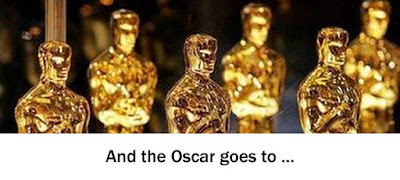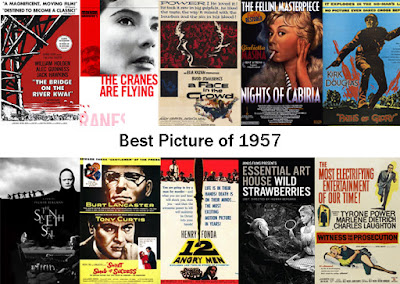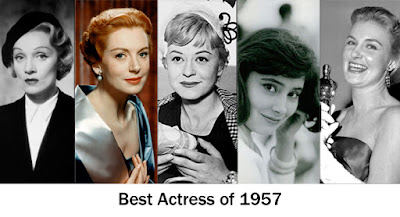Sunday, November 25, 2018
1960 Alternate Oscars
My choices are noted with a ★. Historical Oscar winners are noted with a ✔. Best foreign-language picture winners are noted with an ƒ.
Roger Ebert called Jean-Luc Godard's Breathless the greatest movie debut by a director since Orson Welles's Citizen Kane and went so far as to say, "Modern movies begin here."
Thus, Godard's nod for best director.
Sunday, November 18, 2018
1959 Alternate Oscars
My choices are noted with a ★. Historical Oscar winners are noted with a ✔.
That's some competition for best director, huh. Five of the greatest directors of all time, each turning in what might be the best movie of his career.
At one time or another, I've had three different movies — Some Like It Hot, Rio Bravo and finally North By Northwest — in the top slot. The Academy's choice, Ben-Hur, was no slouch either. A terrific epic, Ben-Hur features what I think is the best action sequence ever, the chariot race.
Vote well and live.
Sunday, November 11, 2018
1958 Alternate Oscars
My choices are noted with a ★. Historical Oscar winners are noted with a ✔. Best foreign-language picture winners are noted with an ƒ. A historical winner who won in a different category is noted with a ✱.
Vertigo famously topped Sight & Sound magazine's 2012 list of the best movies of all-time, which is okay by me even if I don't think it's Alfred Hitchcock's best movie (Rear Window, North By Northwest) or the best movie of 1958 (Mon Oncle, Touch of Evil) or the best movie set in San Francisco (The Maltese Falcon, Bullitt) or ...
You get the picture.
And yet, Vertigo is the only serious contender from 1958 that I've ever felt the urge to watch twice. Several times, in fact.
As I've written before, Vertigo is ostensibly a murder mystery, but it's really a stalker movie with the viewer thrust into a queasy complicity with a control freak. You could legitimately complain that Hitchcock's normally-reliable suspense angle doesn't work, but that's beside the point. What you're really watching is an abusive relationship from the inside out with a sugar coating of murder on top.
Vertigo isn't North By Northwest; Vertigo is Sleeping With the Enemy. You can practically feel the crazy dripping from every scene.
Still, it's a bitter cup of tea. For a more upbeat — and offbeat — brew, perhaps you'd be willing to try another of my favorites, Jacques Tati's Mon Oncle.
Admittedly, Tati is himself an acquired taste, but one well worth acquiring, I'd say. He made the gentlest of gentle comedies, with low-key pleasures akin to watching your dog warm her belly in the sun on a nice Spring day. And I like doggies and warm Spring days.
What's Mon Oncle about? It's about taking your own sweet time in a world that's increasingly obsessed with hurrying through one moment to get to the next moment that needs to be hurried through. In terms of philosophy and spirit, Mon Oncle would make a good double feature with Bruce Brown's surfing classic, The Endless Summer.
Roger Ebert took time to write this in his review of Mon Oncle for his Great Movies series and it captures why I am so enamored of Tati and his Zen-like approach to comedy:
There's also a supporting cast of dogs, who are seen in the first shot and the last, and hurry on their doggy business in between. They don't have an important role in the plot; they're just there, checking things out, marking their territory. I learn from the elegant Web site Tativille.com that Tati found the dogs in the pound, and didn't train them but simply observed and encouraged them. "At the end of the film, we had to get rid of them," Tati wrote. He refused to send them back to the pound, and had an inspiration: He took out an ad in the paper describing them as movie stars, and they all found good homes. There is a lot of Tati in that serendipitous story.
Yes, indeed.
Hey, and lastly, allow me to mention my personal favorite from 1958, the little-seen, under-appreciated Alec Guinness comedy The Horse's Mouth, the story of a crazy painter who wreaks havoc in the pursuit of his artistic vision. If you've ever wondered what the Monkey is like in real life, this is the movie to see. Why, I even look like Alec Guinness! if I must say so myself, which I must, being the only one here.
Note: David Niven (Separate Tables) won for best actor in what is very clearly a supporting performance — I have put him in the supporting actor category where he belongs.
Sunday, November 4, 2018
1957 Alternate Oscars
My choices are noted with a ★. Historical Oscar winners are noted with a ✔. Best foreign-language picture winners are noted with an ƒ.
Alternate Oscar guru Erik Beck of the Boston Becks (who somewhere along the line became Erik Beck of the San Diego Becks — that's some move!) considers 1957 rather than 1939 the best year for movies. He makes a good case.
I originally had eleven movies in my top ten which is a bit of problem if you're at all familiar with the concept of math. I suppose I could have made an exception and nominated all eleven this year, but that would have required me to noodle together a whole new template on Photoshop and who's got time for that?
Eight picks were carved in stone from the get-go: the Academy's choice for best picture, The Bridge on the River Kwai; and my own pick, of course, The Seventh Seal; along with Fellini's Nights of Cabiria; Kubrick's anti-war classic, Paths of Glory; Sweet Smell of Success, maybe the most cynical picture of the decade; 12 Angry Men, starring a dozen really pissed-off dudes; Bergman's second great movie of the year, Wild Strawberries; and Billy Wilder's courtroom classic, Witness for the Prosecution.
On the chopping block? The Cranes Are Flying, the first great movie to come out of the Soviet Union since Stalin destroyed the Russian film industry; A Face in the Crowd, about a populist blowhard who rises to fame and fortune stoking the fears and prejudices of white, rural America; and Throne of Blood, Akira Kurosawa's samurai take on Shakespeare's Macbeth.
After a lot of to-ing and fro-ing, Throne of Blood wound up the odd man out. It's the lowest rated of the bunch on the Internet Movie Database (8.1, mind you, which is terrific) and, well, we've already nominated a lot of Kurosawa movies with more to come. If you really, really wanted to vote for it, my apologies.
Speaking of math, there really should be ten nominees for best actor this year: Tony Curtis, Kirk Douglas, Henry Fonda, Andy Griffith, Alec Guinness, William Holden, Charles Laughton, Robert Mitchum, Victor Sjöström and Max von Sydow. Eleven, if you consider Burt Lancaster in Sweet Smell of Success a lead.
It's a great year for actors. I went with the five who I thought gave the best performance of their careers in 1957.
Subscribe to:
Posts (Atom)







































